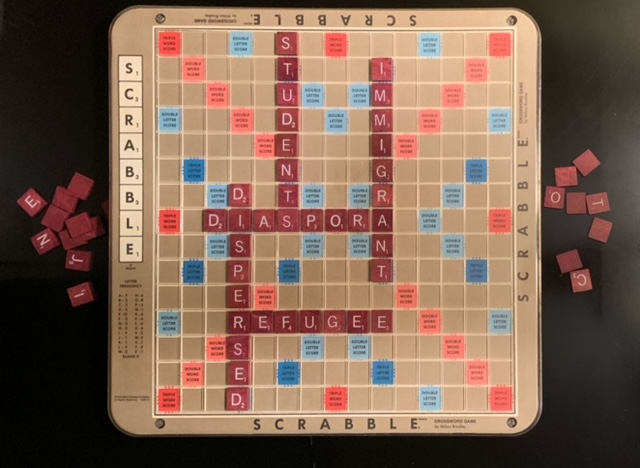This article was written by Jamie Naramore, the International Church Strategist at the Arkansas Baptist State Convention.
When we consider the vast cultural, linguistic, and religious diversity of our growing immigrant, refugee, and international student populations in Arkansas, it can be overwhelming to think of how to effectively engage them with the Gospel. If God has given us this unique opportunity to connect them to Christ through local churches in Arkansas and to see some even start churches in their own languages, then it might be helpful to narrow our focus and identify some priorities to start us down that journey. For many who come from Unreached People Groups and who begin to follow Jesus, there are at least three common factors in their journeys. Not only does it make sense to pursue these as priorities, but these are simple things any believer can do.

1. Sincere Relationships Between Christians and The Unreached
Many internationals will accept an invitation to join you for a holiday meal or attend a church service, often simply out of curiosity. But ask almost any immigrant, refugee, or international student to name some of the main reasons they continued to discover Jesus and ultimately follow him, and you will surely hear about a personal relationship they have had with a Christian.
Pranay Borde, who is planting among South Asian Indians with Hillcrest Community Church in Little Rock, consistently emphasizes the value of sincere relationships in their work. He says, “When you open your close circle to them like your home, or a seat at the Thanksgiving table (something seen as reserved for really close family) that speaks volumes to them because you’ve given them a place of honor. All internationals know that they are in a host culture and are respectful of most any invitation, but what builds trust and keeps the relationship genuine is invested time. Don’t just be friendly, but be friends. And this true friendship, without any feeling of an ‘agenda’, opens them up to honest conversations about family, faith and the Gospel.”
There are surely many programs and ministries we can implement to both meet and serve internationals well, but the goal of those should be sincere relationships. And pursuing sincere friendships with internationals is something that every member of every church can be involved in.
2. Scripture Made Available in a Person’s Heart Language
Recently I was able to share with a Muslim friend in Central Arkansas. As a local religious leader, he was proud to have an English translation of the Bible in a prominent place on his shelf, though he had never read much of it. He is under the assumption that we have corrupted the teachings of Jesus. But when I was able to show him a passage in his heart language, his attitude changed and he has become much more attentive to what Scripture says.
Sarah F. has been co-leading a Japanese Bible Study this past semester alongside a Japanese believer. They have been reading primarily from English translations, because many international students will have some proficiency in English, and even initially prefer reading the Bible in English. Furthermore, sifting through translation options for foreign language Bibles can sometimes be difficult. But upon showing one of the participants a newer Japanese Bible App, the Japanese student said “this helped convey the images of the text in an easier way than the English version.”
This might not seem significant at first, but anyone who has tried studying a foreign language can empathize with the fact that some things just do not translate. When Scripture is made available in someone’s heart language, it opens up a new level of understanding and introduces them to the God who wants to speak to each of us directly. Not only does this introduce them to God’s Word on a personal level, but when we invite them to study the Bible together, as Sarah and so many others are doing, we also begin to model for them what could be the simple beginning of a future foreign language church – whether here, or back in their homeland.
Technology has given us access to thousands of translations in the palm of our hands, and access to many parallel translations in America (ex. English-Spanish, English-Arabic, English-Mandarin) have made studying God’s Word together possible without necessarily having to learn a foreign language. Perhaps the greatest gift you can give to your new international friend is the opportunity to read God’s Word in the language that is most at home in their heart.
3. Praying for God’s Power to be Experienced in Personal Ways
Many who turn to Christ from among Unreached People Groups will do so after enjoying sincere friendships with believers and encountering Jesus through Scripture. But in addition to these, they will often reference an experience of God’s power in a personal way. For many Muslim-background believers this comes through a dream or vision. For those from Hindu, Animist, or Atheist backgrounds, it might be freedom from an addiction or some form of captivity, the healing of an illness, discovering joy and peace over fear and anxiety, or simply experiencing God’s provision in an answered prayer.
These experiences are not a guarantee of faith, but they do give evidence that the Jesus they read about in the Bible still has authority and power over today. We obviously cannot control how God responds to seekers and reveals His power, but we can be faithful in prayer. And that is something that every Arkansas Baptists can do, regardless of whether or not you personally know a person from an Unreached People Group.
As you begin the new year praying for spiritual revival and awakening in our country, would you make a commitment to include the nations whom God has brought to us? If you need help getting started, you can access these resources to help guide you in prayer for the People Groups in Arkansas:
This is the second article in a series related to Diaspora Missions in Arkansas exploring the three main groups of internationals, ministry priorities, and roles of the local church. If you would like further information on how to get involved in reaching the nations next door, contact Jamie Naramore [email protected].

